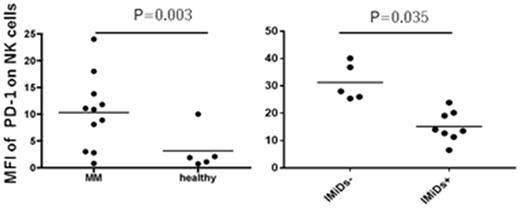Abstract
Introduction:
The exploitation of host immune function is critical for the development of the novel myeloma therapy. NK cells play an important role in the anti-myeloma immune response, and the investigation of NK cell function provides us a beneficial information. We performed phenotypic analyses of NK cells in patients with multiple myeloma.
Methods:
Peripheral blood samples were obtained from 30 multiple myeloma patients (10 newly diagnosed cases of myeloma, 10 relapsed, and 10 in complete or partial remission), and 9 healthy volunteers. NK cells were identified as a fraction of CD3 negative and CD56 positive, and NKp46 was further used for NK cell identification in CD56 positive myeloma cell-containing samples. The phenotype of NK cells was characterized by the expression of SALMF7, NKG2D, FcγRIII, PD-1, and CD56bright or dim.
Results:
At the diagnosis of multiple myeloma, the number of NK cells was significantly low in comparison to that of patients in remission (p=0.013). Regarding immune checkpoint molecule, the expression of PD-1 on the NK cells of myeloma patients was significantly increased in comparison with that of healthy donors (p= 0.003). The expression of SLAMF7 on the NK cell of myeloma patients was decreased significantly (p=0.048), whereas, NKG2D on the NK cells did not differ between myeloma patients and healthy donors. Notably, the expression of FcγRIII, which is a key player in a mechanism of antigen-dependent cytotoxicity, was significantly suppressed in the NK cells of myeloma patients (p=0.001).
In patients who were treated with immunomodulatory drugs (IMiDs), although there was no significant change in the number of total NK cells, the CD56dim NK cell fraction was significantly increased(p=0.019), and significant suppression of PD-1 (p=0.035) on the NK cells were observed.
Conclusion:
The phenotypic analyses suggested that the anti-tumor function of NK cells may be suppressed in myeloma patients. However, IMiDs may increase the activated NK cells. Further investigation is warranted.
Hagiwara: Bristol Myers Squibb: Membership on an entity's Board of Directors or advisory committees, Research Funding.
Author notes
Asterisk with author names denotes non-ASH members.


